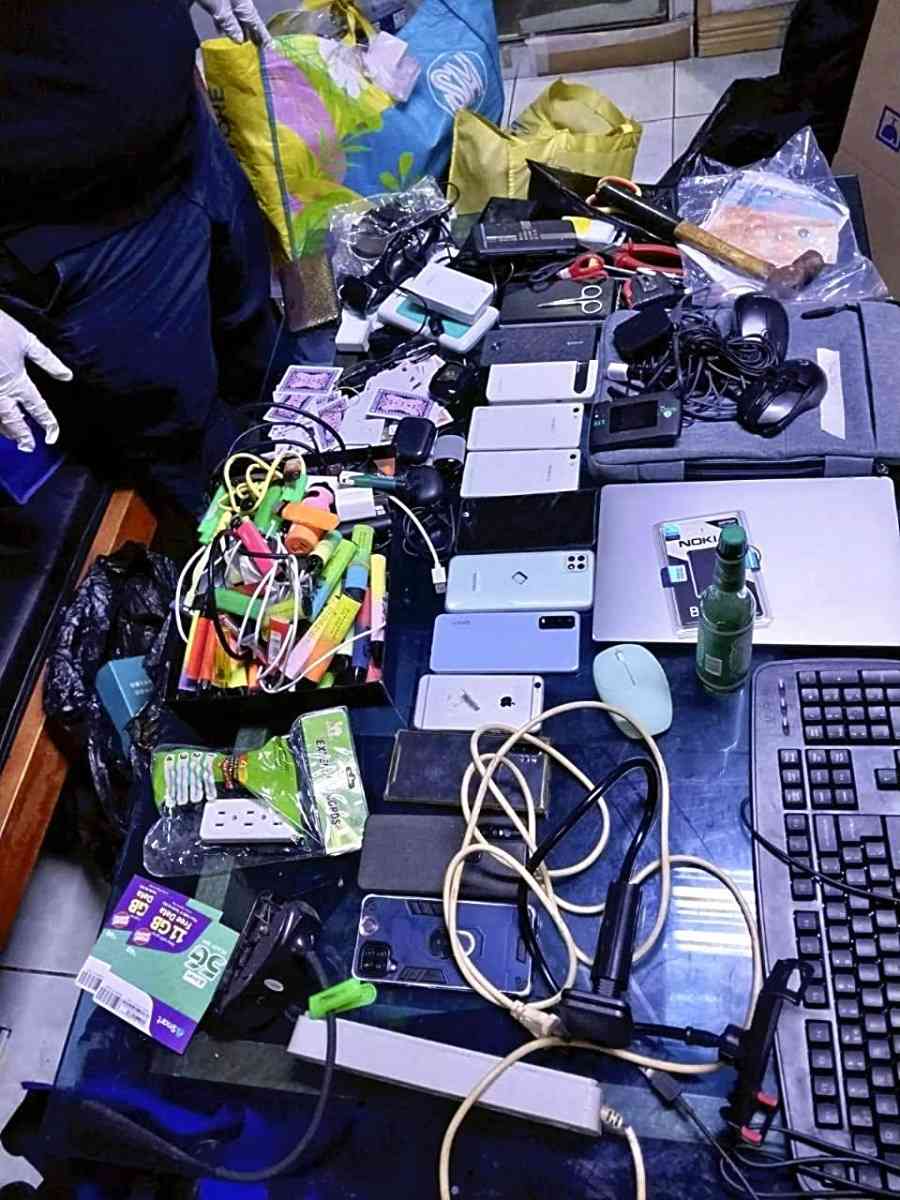Robbery-for-Hire / Challenges Remain In Discovering True Identities Of ‘Luffy’ And ‘Kim’

Smartphones and other devices confiscated by the Philippine authority are seen at an immigration facility where four Japanese suspects were detained.
7:00 JST, February 12, 2023
Four Japanese men suspected of being behind a recent string of violent robberies in Japan have been deported from the Philippines. This is the third and final installment of a series looking at the revelations uncovered so far about the suspected robbery group.
***
“Since that day, I’ve been terrified at home every time I hear a noise in the middle of the night,” said a victim who was assaulted by robbers in his house in Ashikaga, Tochigi Prefecture, in the early hours of the morning on Jan. 10. “I hope this case will be resolved as soon as possible.”
The 53-year-old suffered severe injuries. His hands and feet were bound and the attackers struck his head and back with a hammer. He said the sound of the culprits breaking a window and dashing up the stairs is still stuck in his head.
The victim says he heard the voice of someone speaking at the other end of a mobile phone with one of the attackers, and distinctly remembers the person saying, “It is OK to beat the resident.”
Police believe a robbery ring is behind violent crimes committed across Japan, recruiting members via social media posts offering “dark” part-time jobs.
More than 30 suspects have been arrested so far, but anxieties among the general public persist because the identities of the ringleaders, who used pseudonyms including “Luffy” and “Kim,” have not been confirmed.
Yuki Watanabe, 38, and three other Japanese men who had been held at an immigration facility in the Philippines over a fraud investigation are suspected of issuing orders to members of the robbery ring in Japan.
Data on 15 devices such as smartphones that were seized by the Philippine authorities will be analyzed by Japanese authorities. The results of the analysis will be a crucial part of the investigation.
However, most smartphones in the Philippines are prepaid ones and do not require users to register personal information, so the suspects could deny they used the devices.
Also, the suspected ringleaders used the Telegram communications app, which has a function to automatically erase messages. It is said to be difficult to recover messages that have been deleted.
“Cash in basement” and “prepare gloves and balaclava” were found in messages the Metropolitan Police Department recovered from a suspect’s smartphone during the investigation into the suspected murder-robbery of a 90-year-old woman in Komae, Tokyo.
The function to automatically erase messages had not been set on the seized smartphone.
“Our analysis will depend on the status of the data and the types of smartphones. How much information we can extract will be key,” a senior MPD officer said.
There are fears that the investigation could be prolonged if the MPD needs to seek cooperation from the Philippine authorities to understand the flow of stolen money, among other things.
The MPD believes Luffy and others got members of the group to transport money from Japan to the Philippines where it was converted into pesos for use in the country.
Cooperation with Philippine authorities will likely be necessary to establish how money was transported, collected and changed into pesos.
“The speed of the response of the Philippine authorities will influence the investigation in Japan,” an investigative source said.
The alleged link to social media posts offering dark part-time jobs has triggered calls for measures targeting such posts. Last year, the MPD issued 3,480 warnings over Twitter posts offering dark part-time jobs, up 50% from the previous year.
Other prefectural police headquarters have taken similar measures, but such posts continue to appear online.
Nobuo Komiya, a professor of criminology at Rissho University, said: “Campaigns that appeal to moral conscience alone will not work [on people who respond to such messages]. It’s important to take measures that show in clear terms that people who respond to such offers could be sent to prison and end up ruining their lives.”
Top Articles in Society
-

Man Infected with Measles Reportedly Dined at Restaurant in Tokyo Station
-

Man Infected with Measles May Have Come in Contact with Many People in Tokyo, Went to Store, Restaurant Around When Symptoms Emerged
-

Woman with Measles Visited Hospital in Tokyo Multiple Times Before Being Diagnosed with Disease
-

Australian Woman Dies After Mishap on Ski Lift in Nagano Prefecture
-

Foreign Snowboarder in Serious Condition After Hanging in Midair from Chairlift in Nagano Prefecture
JN ACCESS RANKING
-

Japan PM Takaichi’s Cabinet Resigns en Masse
-

Japan Institute to Use Domestic Commercial Optical Lattice Clock to Set Japan Standard Time
-

Israeli Ambassador to Japan Speaks about Japan’s Role in the Reconstruction of Gaza
-

Man Infected with Measles Reportedly Dined at Restaurant in Tokyo Station
-

Videos Plagiarized, Reposted with False Subtitles Claiming ‘Ryukyu Belongs to China’; Anti-China False Information Also Posted in Japan





















